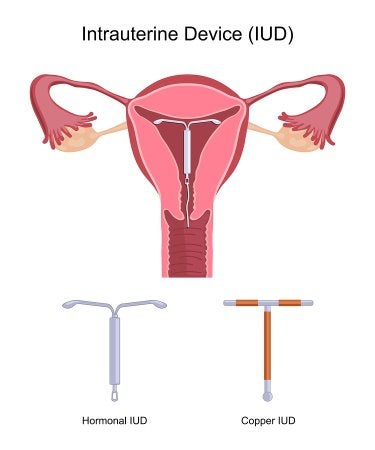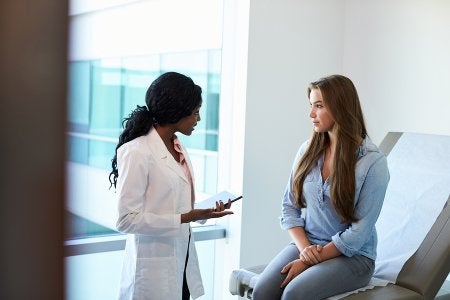-
What to Consider Before Choosing the IUD for Birth Control
Intrauterine devices (IUDs) are a birth control method that’s become quite popular lately. Some women decide it’s the right choice for them because it’s low-maintenance—there’s no need to take a monthly trip to the pharmacy, or to remember to take a pill every day. However, an IUD isn’t necessarily right for every woman. Talk to a gynecologist about your options and your health history before deciding.

There are several IUDs.
Today, women have more IUD options available in the U.S. than in previous years. There are now at least four approved hormonal IUDs, plus one non-hormonal IUD. The hormonal IUDs work because of the time-controlled release of progestin, which is a synthetic version of progesterone—a hormone naturally made by the body. Depending on the brand of IUD you choose, the hormonal options can remain in place and stay effective for three to six years. The non-hormonal IUD is made with a little copper, which prevents sperm from fertilizing an egg. The copper IUD can remain effective for up to 12 years.
IUD insertion can be unpleasant.
Your gynecologist must insert the IUD—it cannot be inserted or removed at home. The doctor will make you as comfortable as possible during the insertion process, however, you should expect some discomfort. Initially, the insertion will feel much like a typical pelvic exam and pap test. The gynecologist will insert a speculum, followed by a long, skinny tube that holds the IUD. This must be inserted through the cervix and into the uterus. Although the experience may not be pleasant, it should be over within just a few minutes.
The adjustment period can last a couple of months.
Once your body has adjusted to the IUD’s presence, you shouldn’t notice anything different, except that you might eventually not have your period anymore. However, during the adjustment process, you may feel bloated, crampy, and occasionally nauseated.
At Washington Surgi-Clinic , we value and respect the unique needs of every woman we care for. Call (202) 659-9403 for an appointment, and one of our gynecologists will take the time to discuss your birth control options at length. If you choose to have an IUD inserted at our Washington, D.C. clinic, you can rest assured your gynecologist will exercise care to ensure your safety and comfort.
-
FAQs About Birth Control and STD Prevention
It’s often said that the only foolproof way of avoiding an unwanted pregnancy and sexually transmitted diseases (STDs) is sexual abstinence. But since lifelong abstinence isn’t always practical, and women have a high risk of being sexually assaulted at some point, it’s also important to know the basics of gynecology care. Every woman should build a relationship with a trusted gynecologist with whom they feel comfortable discussing sensitive issues.

Is it possible for condoms to fail?
Aside from sexual abstinence, the barrier method is the only way to prevent both STDs and unintentional pregnancies. Even condoms can fail, unfortunately. Using condoms correctly (including during oral sex), and using only latex condoms will improve the effectiveness of the barrier method. Some individuals have latex allergies, and may choose lamb skin condoms instead. Know that this type does not protect against HIV infection. Additionally, follow these tips:
- Never use expired condoms.
- Avoid using condoms that were stored in a wallet, car, or in extreme temperatures.
- Don’t use teeth or fingernails to rip open condom packaging.
- Use a new condom for each vaginal, oral, and anal sex act.
Can I get vaccinated against STDs?
There are vaccines available to protect individuals from certain STDs . One of them, the HPV vaccine, can even protect women and men from cervical and oropharyngeal cancers caused by human papillomavirus. Vaccines are also available to prevent hepatitis A and B. Talk to your doctor if you’re unsure of whether you’ve received these vaccines. Remember that you’ll still have to use protection to prevent unintentional pregnancy and other STDs.
What are my options if I’m sexually assaulted?
Unfortunately, sexual assault and rape are far more common than many people realize. The best course of action is to call the police and get to an emergency room, where a doctor can do a rape kit in case you decide to press charges. However, many women choose not to report the assault right away. You should still see your gynecologist as soon as possible, even if you aren’t sure whether you want to get the police involved. Your gynecologist respects patient confidentiality, and can give you the morning after pill to protect you from pregnancy. The doctor can also test and treat you for STDs.
Bring your gynecology questions with you when you arrive for an appointment at Washington Surgi-Clinic. Our gynecologists in Washington, D.C. firmly believe in the importance of patient education and proactive self-advocacy . You can get in touch with a friendly staff member at (202) 659-9403.
-
When Can You Take the Morning-After Pill?
The morning-after pill can help to prevent pregnancy if your regular birth control method failed or if you didn’t use birth control during a sexual encounter. Contrary to popular belief, the morning-after pill is not the same thing as an abortion. The pill will not terminate a pregnancy that has already occurred but will instead ensure that an egg cannot implant itself on the lining of your uterus. Some forms of the morning-after pill also delay ovulation.

Ideally, the morning-after pill should be taken as soon as possible after unprotected intercourse. Over-the-counter forms of the morning-after pill can generally be taken up to 72 hours after unprotected sex, while a prescription form of the pill can be used for up to five days after sex. In each case, the sooner you take the pill, the more likely it is to be effective.
If you have had unprotected intercourse, don’t panic. Make an appointment with a gynecologist in Washington, DC at Washington Surgi-Clinic. Your gynecologist can help with pregnancy prevention and STD testing you may need after having unprotected sex. You can make an appointment by calling (202) 659-9403.
-
What Causes Painful Sex?
Painful sex happens to many women, and often, they are hesitant to talk to their gynecologists about the issue. In reality, you don’t have to live with painful intercourse. Your gynecologist has treatments that can help.
Watch this video to learn more about the causes of painful sex and how your gynecologist can help. Sometimes, simply treating an underlying vaginal infection is all that is needed to make sex more comfortable.
At Washington Surgi-Clinic , we offer confidential gynecology services in Washington, DC, from STD testing to birth control consultations. Don’t let painful sex interfere with your relationships or self-confidence. Schedule an appointment with a provider today by calling (202) 659-9403.
-
What Are the Early Signs of Pregnancy?
Recognizing the early signs of pregnancy will help you have the time to make the decision that is right for you, whether you opt to have a child or choose abortion. Although not every woman experiences notable early symptoms, there may be some indications that you are pregnant before you miss a period. If you have these symptoms and believe you could be pregnant, consider making an appointment with your gynecologist .
Tender Breasts
Hormonal changes in early pregnancy can have a pronounced effect on your breasts. You may notice that your breasts feel tender or that they seem to be fuller or heavier. The changes may feel similar to the changes you experience in your breasts before your period begins. Changes in your breasts may be one of the first indicators of pregnancy, as you may notice symptoms as little as two weeks after conception occurs.
Spotting
Vaginal bleeding doesn’t necessarily mean that you have your period. Implantation bleeding can occur when a fertilized egg becomes implanted in the lining of your uterus. Typically, you will experience this kind of bleeding around 10 to 14 days after conception. Cramping may also occur. This spotting usually occurs before you were due to get your period, and it is often lighter and less intense than menstruation, so it is easy to spot the difference.

Fatigue
During the early stages of pregnancy, many women feel overwhelmingly fatigued. This is because of a surge of the hormone progesterone, which causes drowsiness. Early in pregnancy, you may also experience lowered blood pressure and blood glucose levels alongside increased blood production, which can all further zap your energy.
These symptoms do not necessarily mean that you are pregnant, but if you experience them, consider making an appointment at Washington Surgi-Clinic to determine what is causing them. If you are pregnant, your gynecologist can help with everything from recommending an obstetrician to helping you understand your options for abortion in Washington, DC. Schedule your appointment by calling (202) 659-9403.
-
Questions to Ask Your Doctor Before Your First Pelvic Exam
For many women, visiting a gynecologist for the first time for a pelvic exam can provoke a little bit of anxiety. Fortunately, your doctor will be used to seeing patients for the first time and will make sure you are comfortable and informed throughout the entire experience. When you schedule your appointment, make sure you inform the staff that it will be your first pelvic exam, so that your doctor already understands your situation when you come in. Here are some good questions to ask during your exam.

Do I really need to have a pelvic exam if I am not sexually active?
Being a virgin or not being currently sexually active doesn’t impact your need for preventive care like pelvic exams. In most cases, women should have their first exams when they are 21 or as soon as they become sexually active, but you may need one sooner if you are experiencing symptoms like menstrual irregularities, pelvic pain, and vaginal discharge. If you are a virgin, having a pelvic exam will not affect your hymen in any way.
Will the exam be painful?
Pelvic exams are not normally painful, but sometimes, if you are nervous and tense up, it can be more uncomfortable than usual. Tell your gynecologist if you are feeling anxious, so that he or she can go slowly with the exam. Take deep breaths and relax your muscles as much as possible. Speak up if something feels uncomfortable. Your gynecologist wants to make sure the experience is not painful for you.
What can I do to improve my health?
Your gynecologist is an excellent source of information about a variety of women’s health needs. He or she may recommend ways to reduce your risk of vaginal infections, perform STD testing or treatment, and offer general hygiene advice. He or she can also discuss birth control options with you and help you decide which choice could be the best for you.
Washington Surgi-Clinic is pleased to offer women of all ages comprehensive gynecology services with complete patient confidentiality. To schedule an appointment for a pelvic exam, Pap smear , or any of our other services, please call (202) 659-9403.
-
What Happens If the Abortion Pill Doesn’t Work the First Time?
Pregnancies of fewer than six weeks—calculated by menstrual age—may be terminated with abortion pills. Also known as a chemical abortion, the pills work by halting the progression of the pregnancy and expelling it. This occurs much like a natural miscarriage does. Although rare, it’s possible for the pills to complete the termination. You can reduce the risk of this happening by letting your gynecologist know if you’ve been having morning sickness. You could take an anti-nausea drug to prevent yourself from throwing up the pills.

If your next appointment reveals that the termination is incomplete, you may have the option of taking the pills again. If you prefer to have an in-office procedure, your doctor can schedule this appointment promptly. Some women may have to have a surgical abortion, such as if they are past the six-week point when it becomes apparent that the termination failed.
At Washington Surgi-Clinic, our team of compassionate gynecologists in Washington, D.C. is committed to maintaining strict standards of patient confidentiality . For safe, legal abortions, call (202) 659-9403.
-
What Not to Do Before Your Pap Smear
Even if you’ve had a pap smear before, you might not be familiar with everything you should and shouldn’t do before you see your gynecologist. For instance, you shouldn’t schedule your appointment for the week that you’re expecting your period. You also shouldn’t have sex for at least 24—but preferably 48—hours beforehand, as this can interfere with the results.
Watch this video for other important tips. A doctor featured here explains that grooming doesn’t matter, but the use of feminine products does. Avoid douching, and avoid using any creams or spermicidal foams.
Washington Surgi-Clinic provides pap smears in our clinic in Washington, D.C., as well as a full range of other gynecology services. Call (202) 659-9403 to request an appointment.
-
What to Do After Surviving a Sexual Assault
The most important thing to know after surviving a sexual assault is that it wasn’t your fault. You did nothing wrong, and you have the right to seek medical care , request police assistance, and use local resources that can support you. Survivors are encouraged to go to the ER promptly. If you don’t feel comfortable doing this, or you’d just prefer to see your own trusted gynecologist, you should certainly feel free to do so.

Get to a safe place.
Your first priority is to get away from the attacker. If you can’t call 911 right away, try to get to a public place. If you’re at home, go to a neighbor’s house. If you’re in an urban area, go to the nearest establishment, such as a restaurant or store. People there can assist you, and your attacker is unlikely to follow you to a public place. It’s not uncommon for survivors to know their attackers. For instance, if you’re a college student, you might have been assaulted in your dorm room by someone you know. Get to a friend’s room or find your resident assistant.
Preserve the evidence.
It’s normal to want to take a shower, but try to resist this urge. Even if you think you might not report the rape, you might change your mind later. Preserving the evidence will give you the opportunity to seek justice. Before a medical provider can do a sexual assault exam, you’ll need to avoid doing any of the following:
- Bathing
- Douching
- Changing clothes
- Brushing teeth or hair
- Eating or drinking
Obtain morning-after pills.
A gynecologist can provide you with morning-after pills, or you can obtain them at a pharmacy without a prescription. Follow the instructions carefully to prevent an unintended pregnancy. Know that morning after pills do not induce an abortion. If you obtain these pills right away, it won’t be possible for you to be pregnant yet.
Contact a rape crisis center.
A rape crisis hotline or center will give you the confidential and empowering guidance you need during this difficult time. You’ll learn about your legal rights and options, and your decision to either report or not will be respected.
Women who need morning-after pills in the Washington, D.C. area can trust the professionals at Washington Surgi-Clinic. Our kind and courteous gynecologists want sexual assault survivors to know that we offer confidential care that respects the choices of the patient. Call (202) 659-9403.
-
Common Questions Gynecologists Hear from Teens
All teens who have a vagina should see a gynecologist for regular wellness check-ups. It’s important for teens to find a doctor they feel comfortable with, as it may be necessary to ask some sensitive, personal questions. Remember that doctors have heard it all before—there are no silly or insignificant questions. In fact, gynecologists want their patients to ask lots of questions because better-informed patients are healthier patients.

Do transgender boys need to see a gynecologist?
Everyone who has a vagina needs gynecology care, including transgender boys who have not had gender-affirming surgery. Medical care is often a difficult subject among trans individuals, and it’s not uncommon to hear of someone who hasn’t seen a doctor in years because of the stigma. Transgender boys who find a gynecologist they’re comfortable with may be more likely to continue scheduling preventive wellness services in the years to come.
Why do I keep getting yeast infections?
Yeast infections are uncomfortable and sometimes downright painful. It’s advisable to see a gynecologist for an accurate diagnosis, just in case your yeast infection is actually another medical problem. You’ll also receive effective treatment from your doctor. If you struggle with recurrent yeast infections, your doctor may recommend some lifestyle changes, such as avoiding douching, wiping from front to back, and wearing looser-fitting clothes made from natural fibers.
Is it normal for tampons to hurt?
Putting in a tampon shouldn’t hurt, but it often does if you haven’t had much practice with it yet. Insertion is more difficult if you’re tense, as the muscles will contract. Some girls try to insert the tampon straight up, but there’s a curve to the vaginal canal. Instead, angle it toward the small of your back. Always use an appropriate kind of tampon that corresponds to your flow, and consider giving sponge tampons a try. Remember that tampons dry out the vaginal walls—alternate with pads frequently.
You’ll find warm, welcoming staff and a comfortable atmosphere at Washington Surgi-Clinic , where the well-being and privacy of our patients are our top priorities. We offer wellness exams, STD testing, birth control, and pregnancy termination services in Washington, D.C. Get in touch at (202) 659-9403.
Recent Posts
Popular Posts
categories
- Uncategorized
- STD
- Washington Surgi-Clinic
- Abortion
- Pregnancy
- Pap Smears
- Birth Control Options
- HPV
- Gynecologist
- Pregnancy Test
- Abortion Safety
- IUD
- Pregnancy Termination
- First Trimister
- Cervical Cancer
- Morning After Pill
- Birth Control Pills
- Chlamydia
- Birth Control Shot
- Gonorrhea
- STD Testing
- Birth Control Implant
- Pelvic Pain
- Birth Control Patch
- HIV
- HPV Vaccine
